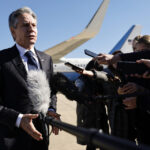Kenya has pledged to remain steadfast in its commitment to promoting peace and security.
This according to Principal Secretary for Internal Security & National Administration Dr. Raymond Omollo who pledged to work tirelessly towards achieving this goal, both domestically, regionally, and internationally.
“Kenya remains committed to promoting peace and security, and we will continue to work tirelessly towards achieving this goal, both domestically, regionally and internationally.” Pledged PS Omollo.
He was speaking during the launch of the Regional Programme on Peacebuilding and Preventing Violent Extremism in East Africa, held at Kwetu Nairobi.
The event, organized in collaboration with the United Nations Development Programme (UNDP), brought together key stakeholders from Kenya, Somalia, South Sudan, and other regional and international organizations dedicated to combating violent extremism in East Africa.
In his speech, Dr. Omollo recognized Kenya’s longstanding efforts in promoting peace within the region. “Our country has long been a strong advocate for peace and has consistently prioritized development over conflict,” he noted, emphasizing that Kenya’s comparative stability sets an example, but also comes with unique challenges.
Kenya, which has witnessed tragic incidents linked to violent extremism including attacks at Westgate, Garissa University, and most recently, the Shakahola tragedy remains vigilant.
“These occurrences have not only led to devastating losses but have also left us in a perpetual state of heightened security and anxiety,” Dr. Omollo stated, underscoring the ongoing threat of religiously motivated violence in the country.
The region’s susceptibility to conflict over natural resources and border disputes, especially in arid and semi-arid regions, has been another catalyst for extremism.
Dr. Omollo pointed out how pre-existing grievances in these areas are exploited by extremist groups to further their agendas, often targeting vulnerable communities.
“We have learned that social cohesiveness and peace cannot be enforced; they must be willingly embraced by citizens to be fully guaranteed and sustainable,” he said.
Reflecting on recent advancements, Dr. Omollo highlighted Kenya’s intensified focus on peacebuilding over the past two years. He mentioned the comprehensive evaluation of Kenya’s Peacebuilding Architecture initiated by President William Ruto in March 2023.
“Our experience has revealed that the risks we face are not unique to Kenya but are common globally,” he noted, emphasizing the need for regional and international cooperation in tackling these challenges.
The event concluded with a call to action, as Dr. Omollo encouraged agencies and government bodies to collaborate with Kenya’s National Counter Terrorism Center (NCTC) and the National Steering Committee on Peacebuilding and Conflict Management.
Additionally, he highlighted Kenya’s network of over 500 community-driven Peace Committees that leverage traditional dispute resolution methods, including the involvement of elders, women, youth, and inter-faith leaders.
As the Regional Programme on Peacebuilding and Preventing Violent Extremism moves into its implementation phase, Dr. Omollo voiced optimism about the potential for further collaboration. “Together, we can contribute to a more peaceful and equitable world that prioritizes prevention and inclusivity for future generations,” he concluded, underscoring the importance of a collective approach to a lasting peace in East Africa.





